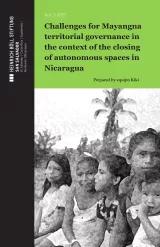Challenges for Mayangna territorial governance in the context of the closing of autonomous spaces in Nicaragua
Although the Mayangna indigenous people are protected by the Constitution, by the Autonomy Statute (Law 28) and by the communal property regime (Law 445), they face the challenges of: surviving the invasion of territories; unmasking the colonial, patriarchal and racist nature of the State; fighting for less hierarchical and unequal power structures and relations between the State, territories and communities; and standing up to the divisive policies and the State’s disdain for the proposals emanating from the territories. We argue that the Nicaraguan State constantly reproduces colonial, patriarchal and racial practices, and that other precepts are required to establish a multi-ethnic, pluricultural and plurinational State in order to avoid ethnocide.
We conclude that the territories need to strengthen community organization as a basis for territorial governance, and that they require community discussion, reflection and analysis on how to face these challenges, as well as on what kind of livelihoods they want for the present and future, and how to improve the participation of adult and young women in territorial governance.
Acknowledgment:
The Heinrich Böll Foundation would like to thank the authors of this text, who for security reasons remain anonymous and who call themselves equipo Kiki - ants, in the Mayangna language.
Product details
Table of contents
- TABLE OF CONTENTS
- ABSTRACT
- I. INTRODUCTION
- II. CONTEXT AND RESEARCH METHODOLOGY
- III. BACKGROUND - TENSIONS AND CONFLICTS IN GOVERNANCE
- A. Gobernance System: Advances, tensions and conflicts
- B. Resisting the mestizo State’s Mode of Gobernance
- C. Indigenous Autonomy
- D. Multi-ethnic regional autonomy on the Coast
- Controlled Caribbean
- IV. CHALLENGES FOR TERRITORIAL GOVERNANCE
- A. Surviving the territorial invasion of new settlers
- B. Unmasking the colonialism, racism and patriarchy that lead to ethnocide
- C. Less hierarchical and unequal power structures and relations between the State, territories and communities
- D. Standing up to divisive policies and disdain for the community proposal
- V. CONCLUSIONS
- VI. REFERENCES
